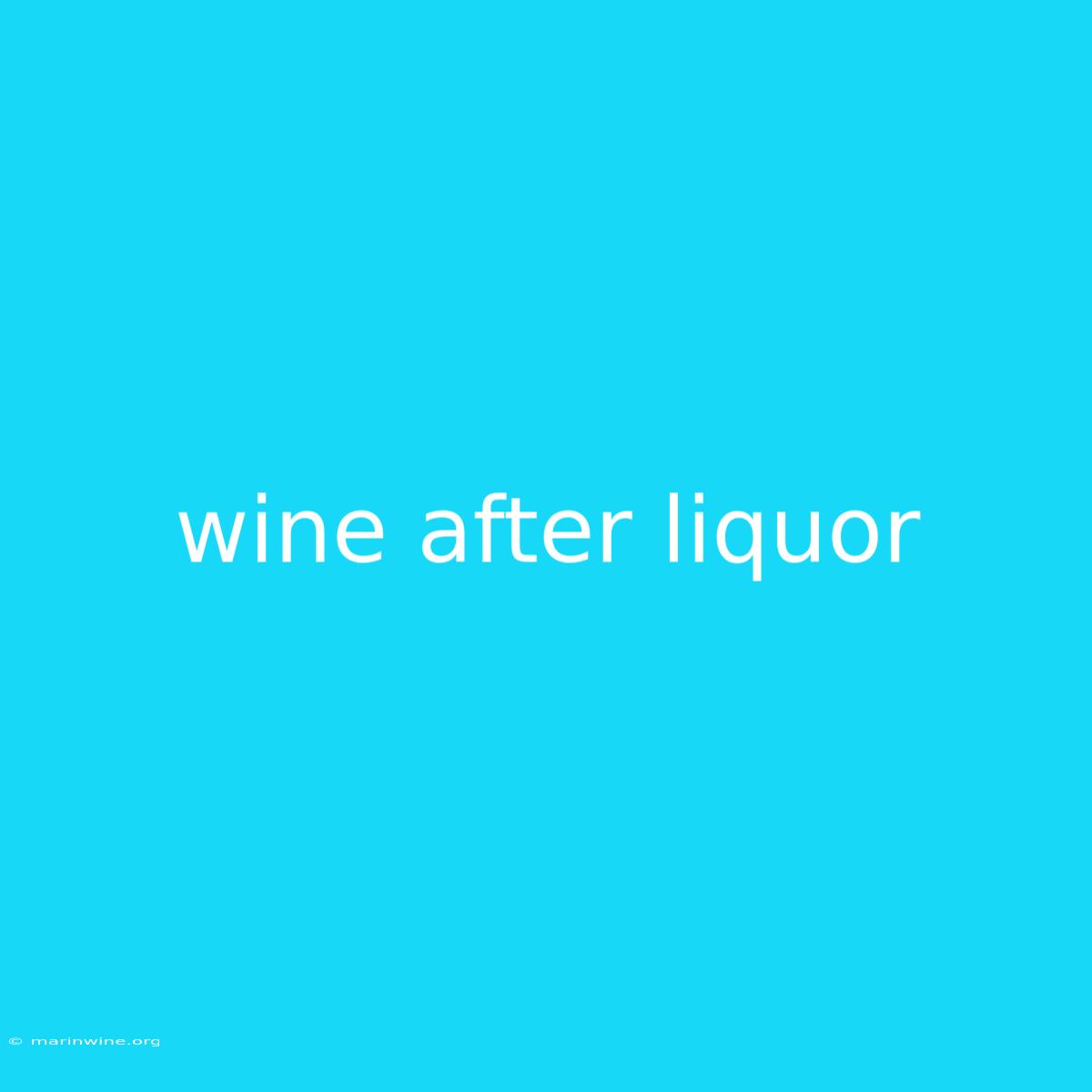Wine After Liquor, Never Sicker: Unraveling the Truth Behind the Old Saying
Have you ever wondered why the old saying "wine after liquor, never sicker" exists? It's a common adage, often whispered at parties or passed down through generations. But is there any truth to this claim? Let's dive into the science behind the saying and explore its potential validity.
Why It Matters: Understanding the potential consequences of alcohol consumption, especially in different sequences, is crucial for responsible drinking and ensuring a pleasant experience. This article delves into the effects of wine after liquor, exploring the science behind the saying and offering practical insights for responsible alcohol consumption.
Key Takeaways of Wine After Liquor:
| Key Takeaways | Explanation |
|---|---|
| No Scientific Evidence for Increased Sickness | Studies show no definitive link between drinking wine after liquor and increased sickness |
| Individual Variation | The effects of alcohol vary depending on factors like tolerance, metabolism, and body size |
| The Importance of Moderation | Consuming excessive amounts of alcohol, regardless of order, can lead to adverse effects |
| Potential for Dehydration | Both wine and liquor can dehydrate, contributing to hangover symptoms |
| Focus on Individual Tolerance | Listen to your body and moderate alcohol consumption based on your personal limits |
Wine After Liquor: Fact or Fiction?
While the saying "wine after liquor, never sicker" has been around for centuries, there's no scientific evidence to support it. The saying likely originated from anecdotal experiences and possibly the perceived difference in alcohol absorption between wine and liquor. However, research suggests that the order of alcohol consumption doesn't significantly affect how the body processes it.
Alcohol Absorption and Metabolism:
The body absorbs alcohol regardless of the type of beverage. The main factor influencing how quickly alcohol affects you is the concentration of alcohol (ABV) and the amount consumed. Alcohol is metabolized by the liver at a relatively constant rate, regardless of the order of drinks.
The Myth of Wine and Liquor:
The myth likely stems from the perceived difference in the speed of absorption for wine and liquor. Wine typically has a lower ABV than most hard liquors, leading to a slower absorption rate. This may give the illusion that wine is less potent, but the reality is that both beverages are metabolized similarly.
The Real Culprit: Excessive Consumption
The most significant factor influencing hangover severity is the total amount of alcohol consumed, not the order. Overconsumption of alcohol, regardless of the type or sequence, can lead to dehydration, nausea, headache, and other unpleasant hangover symptoms.
Individual Factors and Tolerance:
Factors like body weight, metabolism, and tolerance can also influence how alcohol affects individuals. Some people may experience more severe hangover symptoms than others, even after consuming the same amount of alcohol.
Strategies for Minimizing Hangover Symptoms:
- Drink Moderately: Consume alcohol responsibly and within your personal limits.
- Stay Hydrated: Drink plenty of water throughout the night to prevent dehydration.
- Eat Before and During Drinking: Food helps slow down alcohol absorption.
- Choose Lower-ABV Drinks: Opt for beverages with lower alcohol content.
- Allow Adequate Rest: Give your body time to recover after drinking.
FAQ:
Q: Does mixing wine and liquor increase hangover severity? A: No, there's no scientific evidence to support this claim. Hangovers are primarily caused by overconsumption of alcohol, regardless of the type of beverage.
Q: Is it safe to drink wine after liquor? **A: ** It's generally safe to drink wine after liquor, as long as you drink responsibly and within your personal limits.
Q: What about the "beer before liquor, never sicker" saying? A: This saying is also a myth and doesn't have any scientific basis.
Tips for Responsible Drinking:
- Know Your Limits: Be aware of your personal tolerance and stick to moderate consumption.
- Pace Yourself: Drink slowly and allow time between drinks.
- Hydrate: Drink water or non-alcoholic beverages between alcoholic drinks.
- Eat Before and During: Food helps slow down alcohol absorption.
- Avoid Drinking on an Empty Stomach: This can lead to quicker alcohol absorption.
Summary by Wine After Liquor:
While the saying "wine after liquor, never sicker" is a popular adage, there's no scientific evidence to support it. The severity of hangover symptoms is primarily influenced by the total amount of alcohol consumed and individual factors. Responsible drinking practices, including moderation and staying hydrated, are essential for minimizing the risk of hangover symptoms.
Closing Message: The next time you're enjoying a night out, remember that responsible drinking is key to enjoying a pleasant experience. Focus on moderation, stay hydrated, and listen to your body. Enjoy the evening, but remember, "wine after liquor, never sicker" is just a myth.

